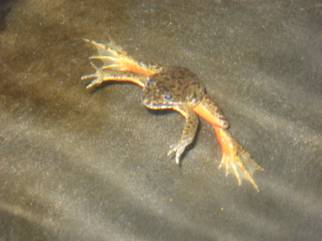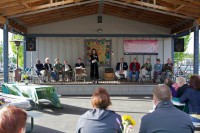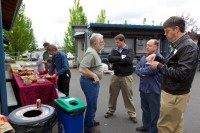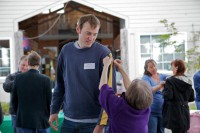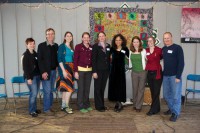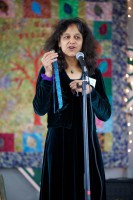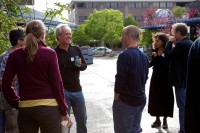By Graduate Research Associate Sarah Weber
The Oregon spotted frogs (OSF) at Cedar Creek Corrections Center (CCCC) are the subjects of a growth comparison study between two separate OSF populations: Black River and Conboy Lake. Inmates at CCCC are raising the two populations side-by-side in separate tanks, keeping all rearing conditions identical, in order to compare growth rates. Measurements have been taken throughout the rearing season and will be taken again just prior to release in October at Joint Base Lewis McChord. The OSF population at Conboy Lake is the only source population that successfully cohabitates with bullfrogs, a primary predator of OSF. The hypothesis is that OSFs from Conboy Lake are bigger in size, and as a result of that, are faster in their response to predation. This study will help determine whether or not captive rearing efforts should focus primarily on the Conboy Lake population.
As part of the comparison study, the OSFs predator response instincts were also tested. Twenty frogs from each population were isolated for a short period of time in a stimulus free environment. One by one, they were placed in a large plastic tub filled with just enough water to cover their bodies. Once they relaxed enough to come to the surface and rest with their eyes out of the water, a plastic ball–tethered to stop before impact–was dropped from above, simulating a predator in the wild. Each individual test is filmed to record the amount of time it takes each frog to react to the “predator”, and also to record response distance in its effort to escape. The film is reviewed and data logged at the Oregon Zoo. The data will allow for a parallel test between the Black River and Conboy Lake populations, and also a comparison between OSF rearing institutions, CCCC and Oregon Zoo.
The experiment took place at CCCC under the supervision and guidance of Senior Research Scientist Dr. Marc Hayes and Kyle Tidwell from the Oregon Zoo. SPP interns Dennis Aubrey and Sarah Weber, and CCCC OSF inmates assisted with noting sex, coloration and tag number as well as taking the measurements and weight of each individual frog in order to identify any size or mass related variation in response. The inmate’s contribution to the predator response experiment and the side by side growth comparison study is integral to development of the OSF captive rearing program. The rearing season continues at CCCC with inmates raising fat, healthy frogs getting closer to their release date.
